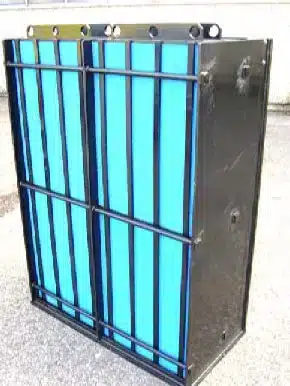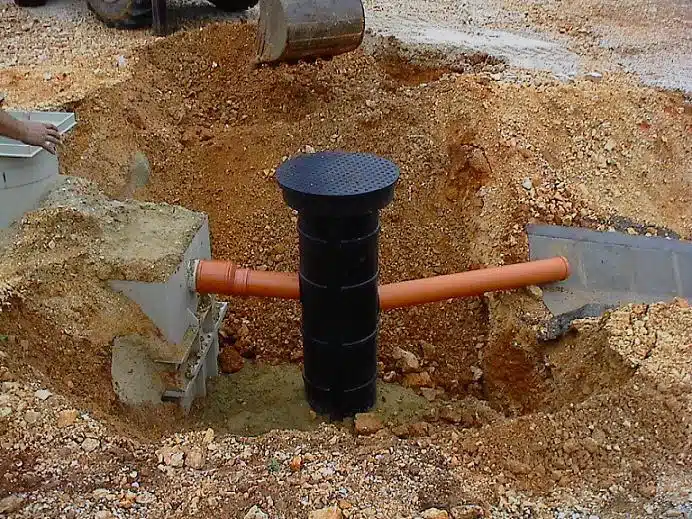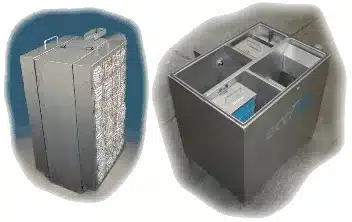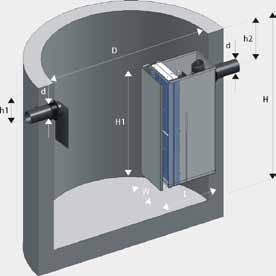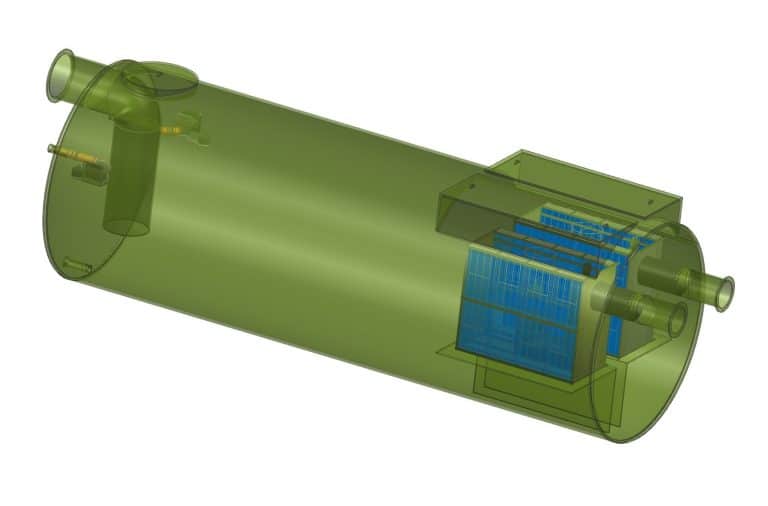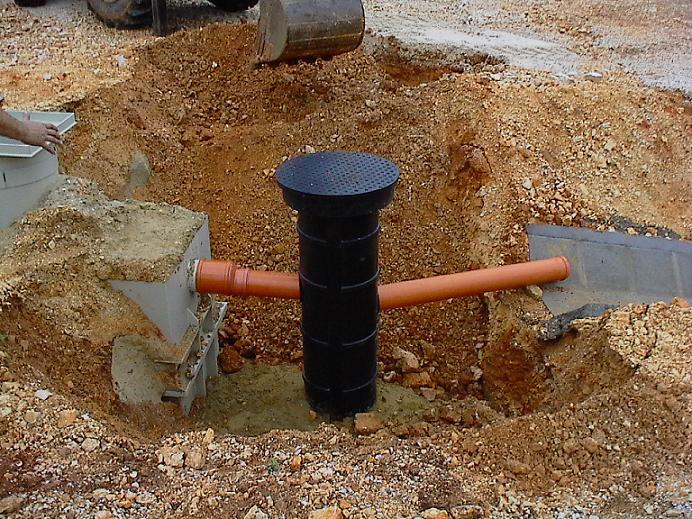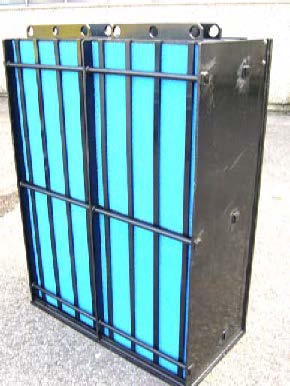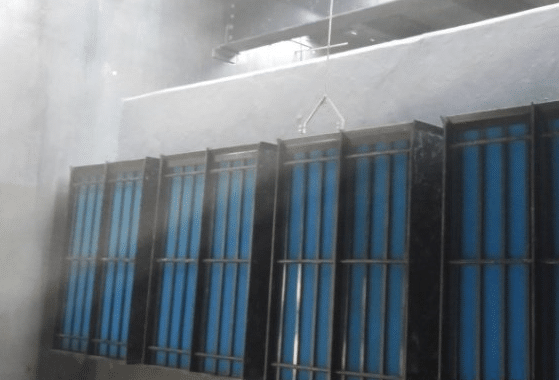In the beautiful landscapes of British Columbia, a hidden battle is happening under our feet. Below ground oil water separators (OWS) act as silent protectors, keeping our waterways safe from harmful substances. But do these systems really meet the high standards of a province known for its strong environmental laws?
British Columbia values its natural beauty and has made below ground OWS systems widespread. These systems are key in keeping oil and water apart before they return to nature. With more industries and cities growing, the need for effective OWS solutions is greater than ever.
The Municipal Wastewater Regulation in BC demands high standards for wastewater facilities and the quality of the water released. This pushes manufacturers and suppliers to create top-notch OWS solutions. Companies like Freytech Inc. are leading the way with advanced British Columbia Below Ground OWS systems that separate oil and water better than ever.
We will dive into the world of below ground oil water separators in British Columbia. We’ll look at the different types of systems, their design, and how they protect our environment. We’ll see how these systems follow BC’s tough rules and help keep our water safe.
Key Takeaways
- Below ground OWS systems are key for managing wastewater in BC
- BC’s Municipal Wastewater Regulation demands high water quality standards
- Advanced OWS solutions improve separation efficiency
- Proper OWS use is vital for protecting the environment
- New technologies are being developed to meet BC’s strict rules
Introduction to Below Ground Oil Water Separators in British Columbia
Below Ground OWS are key in protecting British Columbia’s environment. They keep oil and pollutants out of water, keeping our natural water clean. In BC, these systems are linked to managing sewage and septic systems.
Definition and Purpose of OWS Systems
Oil Water Separators catch and hold small amounts of fuel, oil, and sediment from runoff water. They act as a backup to catch spills, keeping our environment safe. These systems don’t handle waste but protect against spills.
Importance in Environmental Protection
Using Below Ground OWS is crucial for protecting British Columbia’s environment. They keep our water clean by stopping oil and pollutants from getting in. By working with septic systems and sewage treatment, BC keeps our water safe and clean.
Regulatory Framework in British Columbia
The Municipal Wastewater Regulation (B.C. Reg. 87/2012) in British Columbia sets rules for wastewater, including OWS. It covers authorization, system details, and environmental studies. Following these rules makes sure OWS help protect BC’s environment.
Types of Below Ground OWS Systems Used in British Columbia
British Columbia uses Below Ground Oil Water Separators to keep its underground infrastructure clean. These systems are key in protecting the environment. They remove oil and other pollutants from water before it’s released.
Gravity Separation Systems
Gravity separation systems are a popular choice for Below Ground Oil Water Separators. They work by using the difference in density between oil and water to separate them. Oil floats to the top while water goes to the bottom.
This method is great for simple separation tasks in wastewater treatment.
Coalescing Plate Separators
Coalescing plate separators boost the separation process in underground setups. They have angled plates that increase the surface area for oil droplets to gather and merge. This makes them perfect for removing smaller oil particles from wastewater.
Enhanced Flotation Systems
Enhanced flotation systems are the newest in Below Ground Oil Water Separators. They use air bubbles or chemicals to help separate oil. These systems can handle a variety of contaminants, like motor oil and diesel.
They offer top-notch performance for complex wastewater treatment in British Columbia’s industrial areas.
British Columbia Below Ground OWS: Design and Installation Considerations
Designing and installing below ground oil water separators (OWS) in British Columbia needs careful planning and expertise. These solutions are key to protecting the environment and keeping sanitation sustainable. It’s important to size them right to separate oil and water effectively, based on how much water flows and how much contamination there is.
Where you put catch basins and trenches matters a lot for how well they work. They need to be placed right to catch runoff and send it to the OWS. Working with local authorities is also important to connect the system to storm water networks and follow the rules.
OWS design aims to slow down water flow so oil and fuel can float and sediment settles. This is vital for the system to work well in treating wastewater. Getting professionals to install it is key, often needing special safety steps to protect workers and keep the system safe.
Following British Columbia’s rules is a must when using these sanitation practices. Designers must think about soil type, groundwater levels, and the local climate. By paying attention to these details, below ground OWS can help protect the environment in British Columbia.
Environmental Impact and Compliance with BC Regulations
British Columbia takes wastewater management seriously. The province’s environmental rules protect water resources and encourage sustainable sanitation. These rules guide how businesses handle their wastewater and affect oil water separator designs.
Municipal Wastewater Regulation Requirements
BC’s Municipal Wastewater Regulation has strict standards for effluent quality. These standards make sure discharged water is clean enough. Companies must follow these rules to avoid fines and protect the environment.
Discharge Limits and Monitoring
The province has clear limits for hydrocarbons, at 10 PPM. Some companies, like Freytech, aim for 5 PPM. Regular monitoring and sampling are key to meeting these standards.
Businesses must follow specific steps for sampling and analyzing effluent. This ensures they meet the required cleanliness levels.
Environmental Impact Studies
Environmental impact studies are vital in BC’s wastewater management. They help understand the effects of wastewater on local ecosystems. By knowing these impacts, businesses can choose better wastewater treatment methods. This leads to more sustainable sanitation practices.
Maintenance and Operation of Below Ground OWS in British Columbia
Proper wastewater management is key in British Columbia. Below ground oil water separators (OWS) need regular care to work well. Daily checks are important to catch problems early.
These inspections keep the system running right and stop environmental risks.
Checking fuel, oil, and sludge levels weekly is crucial for treating wastewater. Operators use special tools to measure these levels. This helps figure out when to skim or clean the separator. In British Columbia, skim the surface oil when it’s 5 cm thick.
Sampling effluent monthly is a must for OWS upkeep. These samples check if the system meets discharge standards. Keeping track of all maintenance is important.
Details are logged in a logbook and an online database. This is key for following rules and making the system better.
When sludge hits 15 cm, a full cleanout is needed. This means removing all contents and cleaning the separator well. Regular care makes the OWS last longer and work better. By doing this, businesses keep their wastewater solutions working well and following local laws.
Freytech Inc.’s Advanced OWS Solutions for British Columbia
Freytech Inc. is leading the way in British Columbia with their Below Ground OWS technology. They tackle the region’s wastewater challenges with innovative systems. These systems make sure industries follow strict environmental laws.
Enhanced Coalescing Technology
Freytech’s coalescing technology is at the forefront of oil-water separation. Their systems can separate oil from water down to 5 PPM, beating the usual 10 PPM. For emulsified oil, they achieve an amazing 0.1 PPM separation.
Separation Efficiency and Performance
Freytech’s OWS solutions are versatile, handling many types of hydrocarbons. They can separate motor oil, diesel, gasoline, and jet fuel. This makes them perfect for various industries in British Columbia.
Customization for British Columbia’s Specific Needs
Freytech knows every facility in British Columbia has its own wastewater needs. They provide customized OWS solutions for each client. This ensures their systems work best and meet all local environmental laws.
These separators are crucial in storm water systems. They process runoff to meet the US EPA’s Clean Water Act standards. With effective oily water treatment, facilities protect the environment and dodge big fines.
Conclusion
British Columbia Below Ground OWS systems are crucial for managing wastewater and protecting the environment. They keep our water clean and safe. Companies like Freytech offer advanced solutions tailored for BC’s unique conditions.
Following provincial rules is essential for using OWS systems correctly. Regular upkeep ensures they function at their best. When designed and installed properly, below ground OWS units are key to keeping BC’s waters healthy.
The need for effective wastewater management is growing. British Columbia’s commitment to environmental protection is clear in its OWS regulations. By using the best technology and keeping up with maintenance, BC can lead in sustainable water practices.

